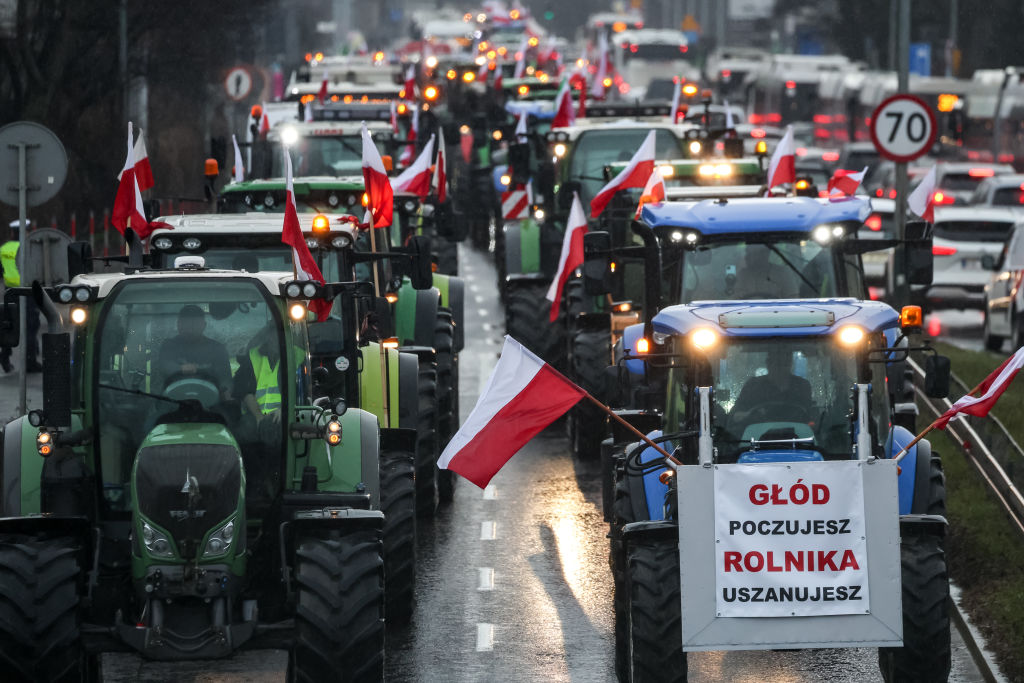'Trade spats are a sign of how the costs of a long war are only now sinking in'
Opinion, comment and editorials of the day


A free daily email with the biggest news stories of the day – and the best features from TheWeek.com
You are now subscribed
Your newsletter sign-up was successful
'France's pot shot at Ukrainian chicken says a lot'
Lionel Laurent at Bloomberg
A "fight over food in Europe shows the growing problem of weariness" of Ukraine's allies as its war drags on, says Lionel Laurent. Polish farmers are protesting shipments of cheap Ukrainian grain. French poultry farmers are "calling for a halt to cheap Ukrainian chicken imports," and the government, losing ground to far-right rivals, is promising "to protect protesting farmers." Subsidizing them might help, but so would making it clear what defeat on Europe's border would look like.
The Week
Escape your echo chamber. Get the facts behind the news, plus analysis from multiple perspectives.

Sign up for The Week's Free Newsletters
From our morning news briefing to a weekly Good News Newsletter, get the best of The Week delivered directly to your inbox.
From our morning news briefing to a weekly Good News Newsletter, get the best of The Week delivered directly to your inbox.
'An EPA squeeze on fossil fuels'
The Wall Street Journal editorial board
The EPA recently is "slashing" ambient air quality rules, says The Wall Street Journal editorial board. It's reducing the standard for fine particulate matter — generated in fossil-fuel combustion — by 25%. But 84% of this pollution comes from "non-industrial sources" like road dust and agriculture. The change could make permitting harder for "everything from new gas-fired power plants to semiconductor factories and highway construction," yielding "negligible public-health benefits" but big costs. "Climate trumps all in the Biden administration."
'Recycling doesn't work — and the plastics industry knew it'
Kate Aronoff in The New Republic
A free daily email with the biggest news stories of the day – and the best features from TheWeek.com
"Hardly any plastics can be recycled," says Kate Aronoff. One study found that between 1990 and 2015 90% of plastics "ended up in a landfill, were burned, or leaked into the environment." Another study concluded that "just 5 to 6 percent are successfully recycled." The petrochemical industry knew decades ago recycling was no solution, but insisted it worked to ward off potential plastic bans. "Plastics are a plague, and the executives who produce them should be made into pariahs."
'"Work longer" is no solution for people who can't afford to retire'
Teresa Ghilarducci in the Los Angeles Times
America's retirement system is "severely broken," says Teresa Ghilarducci. "Most Americans do not have enough money to retire on," so they keep working. Many workers 75 and older — "the fastest-growing age segment of the workforce" — are "stuck in low-paying, physically demanding" jobs. A "Gray New Deal," with subsidized, guaranteed retirement accounts and advanced-funded pensions, and expanded Social Security, would save money and lives. "Working until you drop is not a civilized plan for a civilized society."
Harold Maass is a contributing editor at The Week. He has been writing for The Week since the 2001 debut of the U.S. print edition and served as editor of TheWeek.com when it launched in 2008. Harold started his career as a newspaper reporter in South Florida and Haiti. He has previously worked for a variety of news outlets, including The Miami Herald, ABC News and Fox News, and for several years wrote a daily roundup of financial news for The Week and Yahoo Finance.
-
 The Gallivant: style and charm steps from Camber Sands
The Gallivant: style and charm steps from Camber SandsThe Week Recommends Nestled behind the dunes, this luxury hotel is a great place to hunker down and get cosy
-
 The President’s Cake: ‘sweet tragedy’ about a little girl on a baking mission in Iraq
The President’s Cake: ‘sweet tragedy’ about a little girl on a baking mission in IraqThe Week Recommends Charming debut from Hasan Hadi is filled with ‘vivid characters’
-
 Kia EV4: a ‘terrifically comfy’ electric car
Kia EV4: a ‘terrifically comfy’ electric carThe Week Recommends The family-friendly vehicle has ‘plush seats’ and generous space
-
 ‘Poor time management isn’t just an inconvenience’
‘Poor time management isn’t just an inconvenience’Instant Opinion Opinion, comment and editorials of the day
-
 Witkoff and Kushner tackle Ukraine, Iran in Geneva
Witkoff and Kushner tackle Ukraine, Iran in GenevaSpeed Read Steve Witkoff and Jared Kushner held negotiations aimed at securing a nuclear deal with Iran and an end to Russia’s war in Ukraine
-
 ‘The forces he united still shape the Democratic Party’
‘The forces he united still shape the Democratic Party’Instant Opinion Opinion, comment and editorials of the day
-
 ‘Those rights don’t exist to protect criminals’
‘Those rights don’t exist to protect criminals’Instant Opinion Opinion, comment and editorials of the day
-
 Trump’s EPA kills legal basis for federal climate policy
Trump’s EPA kills legal basis for federal climate policySpeed Read The government’s authority to regulate several planet-warming pollutants has been repealed
-
 ‘This is something that happens all too often’
‘This is something that happens all too often’Instant Opinion Opinion, comment and editorials of the day
-
 House votes to end Trump’s Canada tariffs
House votes to end Trump’s Canada tariffsSpeed Read Six Republicans joined with Democrats to repeal the president’s tariffs
-
 ‘The mark’s significance is psychological, if that’
‘The mark’s significance is psychological, if that’Instant Opinion Opinion, comment and editorials of the day
